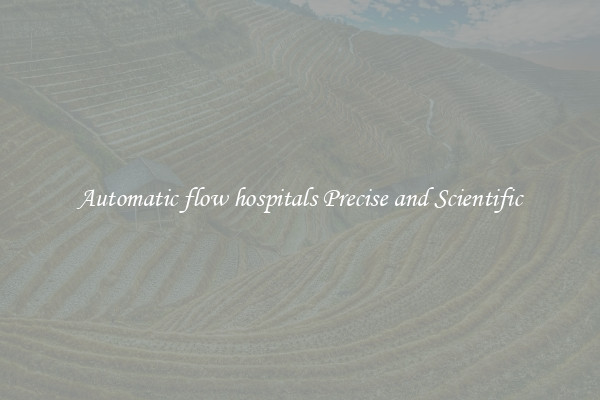Automatic flow hospitals Precise and Scientific
Automatic Flow Hospitals: A Precise and Scientific Approach to Healthcare

In recent years, the concept of automatic flow hospitals has gained significant attention in the healthcare industry. These innovative institutions focus on streamlining patient care processes and improving the overall efficiency of healthcare delivery. By incorporating cutting-edge technology and implementing precise and scientific protocols, these hospitals are revolutionizing the way healthcare is provided.
At the core of an automatic flow hospital is the principle of optimizing patient flow. Traditional hospitals often face challenges in managing patient movement, leading to long wait times, crowded waiting areas, and delayed access to critical care. Automatic flow hospitals tackle these issues head-on by employing advanced patient management systems and state-of-the-art technology.
One of the hallmarks of automatic flow hospitals is the implementation of intelligent patient routing systems. These systems use real-time data to guide patients through their healthcare journey. From check-in to discharge, patients are smoothly guided through various departments and services based on their specific needs. This precision ensures that patients receive the right level of care at the right time while minimizing unnecessary delays.
Robotic process automation (RPA) is another crucial aspect of automatic flow hospitals. By automating repetitive and time-consuming tasks, such as the administration of medication or data entry, healthcare professionals can focus on delivering high-quality care to patients. RPA not only saves time but also reduces the risk of human error, enhancing patient safety.
Additionally, automatic flow hospitals employ smart monitoring systems that continuously collect and analyze patient data. From vital signs monitoring to medication adherence tracking, these systems provide healthcare professionals with real-time insights into patients’ health status. This enables early identification of potential complications and allows for prompt intervention, thereby improving patient outcomes.
Moreover, automatic flow hospitals prioritize the use of evidence-based medicine. Clinical decision support systems provide healthcare professionals with the latest scientific research and medical guidelines at their fingertips. By integrating this knowledge into their practice, physicians and nurses can make more informed and accurate treatment decisions, promoting optimal patient care.
The benefits of automatic flow hospitals extend beyond patient care. Efficient resource management is a critical aspect of these institutions. Through data-driven analytics, such hospitals can accurately anticipate patient demand and allocate resources accordingly. This reduces wastage, minimizes costs, and ultimately results in improved financial sustainability.
In conclusion, automatic flow hospitals represent a modern and innovative approach to healthcare delivery. By leveraging advanced technology, implementing precise patient management systems, and maximizing scientific knowledge, these hospitals are revolutionizing the industry. The future of healthcare lies in the seamless integration of technology and precise protocols, leading to improved patient experiences, enhanced outcomes, and more efficient healthcare delivery.

View details

View details

View details

View details








